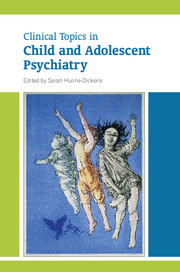Book contents
- Frontmatter
- Contents
- List of tables
- List of boxes
- List of figures
- List of contributors
- Preface
- 1 Child psychiatry and the people who have shaped it
- 2 Fabrication and induction of illness in children
- 3 Personality disorders as disorganisation of attachment and affect regulation
- 4 Post-traumatic stress disorder and attachment: possible links with borderline personality disorder
- 5 Management of antisocial behaviour in childhood
- 6 Pharmacology for attention-deficit hyperactivity disorder, Tourette syndrome and autism spectrum disorder
- 7 Pharmacology for anxiety and obsessive–compulsive disorders, affective disorders and schizophrenia
- 8 Pharmacological management of core and comorbid symptoms in autism spectrum disorder
- 9 Pharmacological treatment of depression and bipolar disorder
- 10 Cognitive–behavioural therapy with children, young people and families: from individual to systemic therapy
- 11 Anxiety disorders
- 12 Somatising: clinical presentations and aetiological factors
- 13 Somatising: management and outcomes
- 14 Evaluating psychological treatments for children with autism
- 15 Attention-deficit hyperactivity disorder: assessment and treatment
- 16 Schizophrenia
- 17 Tourette syndrome
- 18 Sleep disorders
- 19 Self-harm in adolescents
- 20 Adolescent substance misuse: an update on behaviours and treatments
- 21 Eating disorders
- 22 Gender dysphoria in young people
- 23 The psychiatry of children aged 0–4
- Index
8 - Pharmacological management of core and comorbid symptoms in autism spectrum disorder
Published online by Cambridge University Press: 02 January 2018
- Frontmatter
- Contents
- List of tables
- List of boxes
- List of figures
- List of contributors
- Preface
- 1 Child psychiatry and the people who have shaped it
- 2 Fabrication and induction of illness in children
- 3 Personality disorders as disorganisation of attachment and affect regulation
- 4 Post-traumatic stress disorder and attachment: possible links with borderline personality disorder
- 5 Management of antisocial behaviour in childhood
- 6 Pharmacology for attention-deficit hyperactivity disorder, Tourette syndrome and autism spectrum disorder
- 7 Pharmacology for anxiety and obsessive–compulsive disorders, affective disorders and schizophrenia
- 8 Pharmacological management of core and comorbid symptoms in autism spectrum disorder
- 9 Pharmacological treatment of depression and bipolar disorder
- 10 Cognitive–behavioural therapy with children, young people and families: from individual to systemic therapy
- 11 Anxiety disorders
- 12 Somatising: clinical presentations and aetiological factors
- 13 Somatising: management and outcomes
- 14 Evaluating psychological treatments for children with autism
- 15 Attention-deficit hyperactivity disorder: assessment and treatment
- 16 Schizophrenia
- 17 Tourette syndrome
- 18 Sleep disorders
- 19 Self-harm in adolescents
- 20 Adolescent substance misuse: an update on behaviours and treatments
- 21 Eating disorders
- 22 Gender dysphoria in young people
- 23 The psychiatry of children aged 0–4
- Index
Summary
Autism spectrum disorders (ASD) are frequently grouped as pervasive developmental disorders to include childhood autism, atypical autism and Asperger syndrome. They are recognised as complex neurodevelopmental disorders, often becoming clinically apparent in the second or third year of life. The diagnosis is based on disturbance in the domains of reciprocal social interactions, communication, restricted interests and stereotyped patterns of behaviour. Up to two-thirds of affected individuals will present with a degree of global intellectual disability, although some may have a very uneven profile of abilities. Accurate diagnosis, usually made by a combination of direct observation of behaviour and informant history, is complicated by considerable heterogeneity in the manifestation of these core deficits, by variation in ability level and by developmental changes. However, it is clear that ASD usually persist across the lifespan, resulting in varied and complex needs in adult life. The course of development into old age is, as yet, largely unknown.
The prevalence of ASD in children is about 1.2% (Baird et al, 2009). There are no accurate prevalence figures available for adults, but in 2011 it was estimated there were 5.3 million adults with diagnosed ASD across Europe, the USA and Japan (Nightingale, 2012). A male excess of between 3:1 and 4:1 is generally observed. Maladaptive behaviours and comorbid psychiatric symptoms are common. Autism is thus a relatively common, chronic, potentially substantially disabling disorder, with significant costs to both the affected individual and family members. Recent guidance from the National Institute for Health and Care Excellence (NICE) has addressed assessment and management in both young people and adults (National Institute for Health and Clinical Excellence, 2011, 2012; National Institute for Health and Care Excellence & Social Care Institute for Excellence, 2013) and the Autism Act 2009, which extends to England and Wales, has been a landmark in statutory legislation. These developments, along with acknowledgement of the life-time needs imposed by the disorder in the context of normal-range intellectual ability as well as disability, will lead to a great increase in referrals to adult psychiatry services, with a need for service adaptations.
Medication management in autism
Educational and psychosocial interventions are the mainstay of treatment, with the aim of improving language acquisition and maximising communication and social skills.
- Type
- Chapter
- Information
- Clinical Topics in Child and Adolescent Psychiatry , pp. 112 - 128Publisher: Royal College of PsychiatristsPrint publication year: 2014



